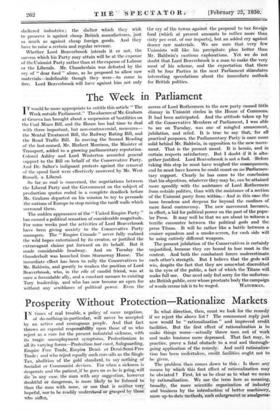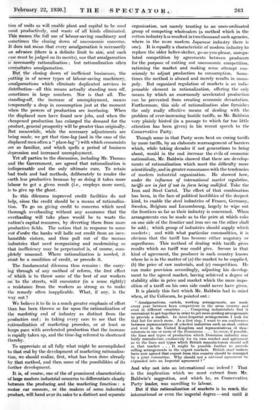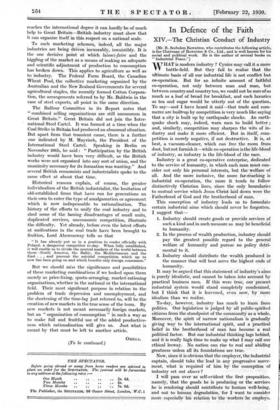Prosperity Without Protection—Rationalize Markets
IN tines of real trouble, a policy of mere negation, of do-nothing-in-particular, will never be accepted by an active and courageous people. And that fact throws an. especial responsibility upon those of us who reject as a cure for the present industrial .sickness, with its tragic unemployment symptoins, ProtectioniSm in all its varying forms—Protection tout court, Safeguarding, Empire Free Trade; Empire Demi- or Demi-Semi-Free Trade; and who reject equally such cure-alls as the Single Tax, abolition Of the gold standard, to say nothing . of Socialist or Communist devices. For when a sickness is desperate and the patient :if he goes on as he is *going, will die 'in any case, the man with any suggestion, however. doubtful or dangerous, is More likely to -be- listened to than the man with none, or one that is neither very', hopeful,-nor to be readily Understood Or 'grasped by those. who Stiffer. In what direction, then, must_ we look for the remedy if we reject the above list.? The commonest reply just now would be " rationalization " and improved credit facilities. But the first effect of rationalization is to make things Iv'orseaCtually throW men out of work and make business more depressed. That fact May, in practice, prove a fatal obstacle to a real and thorough- going application Of the remedy. And until rationaliza- tion has been undertaken, credit facilitieS ought not to be -giVen. • The problem then comes down to this : Is there any means by which this first effect of rationalization may be obviated ? First, let us be clear as to what we mean by rationalization. We use the term here as meaning, broadly, the more scientific organization of industry and 'business by the introduction of better machinery, more up-to-date methodg,'suth enlargement' r amalgama lion of units as will enable plant and capital to be used most productively, and waste of all kinds eliminated. This means tfie,full use of labour-saving, machinery and sometimes the closing down of uneconomic concerns. It does not mean that every amalgamation is necessarily an advance (there is a definite limit to size, and each case must be judged on its merits), nor that amalgamation is necessarily rationalization ; but rationalization often necessitates amalgamation. But the closing down of inefficient businesses, the putting in of newer types of labour-saving machinery, amalgamations which eliminate duplicated services in distribution—all this means actually standing men off, sometimes in large numbers. Nor is that alt. -The standing-off, the increase of unemployment, means temporarily a drop in consumption just at the moment when the powers of production are increasing. When the displaced men have found new jobs, and when the cheapened production has enlarged the demand for the product, general prosperity will be greater than originally. • But meanwhile, while the necessary adjustments are being made, we get that time-lag (and in the case of the displaced men often a place-lag ") with which economists are so familiar, and which spells a period of business depression and increased unemployment.
Yet all parties to the discussion, including Mr. Thomas and the Gore. rnment, are agreed that rationalization is indispensable and the only ultimate cure. To retain bad tools and bad methods, deliberately to render the earth less productive because by so doing it takes more labour to get a given result (i.e., employs more men), is to give up the ghost.
In- this dilemma improved credit facilities do not help, since the credit should beg means of rationaliza- tion. To go on giving credit to concerns which need thorough overhauling without any assurance that the overhauling will take place would be to waste the, nation's capital resources, by diverting them from more productive fields. The notion that in- response to some mot d'ordre the banks will ladle out credit from an inex- haustible cistern, and thus pull out of the morass industries that need reorganizing and modernizing so that inefficiency may be perpetuated is, of course, com- pletely unsound. Where rationalization is needed, . it Must be a'condition of credit, or precede it.
The fundamental dilemma thus remains : 'the carry- ing through of any method of reform, the first effect of which is to throw some of the best of our workers on 'to the " streets, will encounter (in a sense rightly) a resistance from the workers so strong as to make the remedy often inapplicable. What, if any, is the way outy We believe it to lie in a much greater emphasis of effort than has been thrown so far upon the rationalization of the marketing end of industry as distinct from the production end ; in taking every care to see that the rationalization of marketing precedes, or at least so keeps pace with accelerated production that the increase is rapidly taken up, and the time-lag referred to shortened thereby.
To appreciate at all fully what might be accomplished to that end by the development of marketing rationaliza- tion, we should realize, first, what has been done already by _that method, and then some of the possibilities of its further development.
It is, of course, one-of the of prominent characteristics of large modern industrial concerns to differentiate clearly between the producing and the marketing function : a motor car concern, or the makers of some industrial product, will hand over its sales to a distinct and separate organization, not merely trusting to an unco-ordinated group of competing wholesalers (a method which in the cotton industry has resulted in two thousand such agencies, where in the more modern Japanese industry there is one). It is equally a characteristic of modern industry to replace the older helter-skelter, go-as-you-please, unregu- lated competition by agreements between producers for the purpose of cutting out uneconomic competition, rationing the market and making some attempt con- sciously to adjust production to consumption. Some- times the method is abused and merely results in mono- poly. But organized regulation of markets is an indis- pensable element in rationalization, offering the only means by which an enormously accelerated production can ' be prevented from creating economic devastation. Furthermore, this side of rationalization also furnishes the only really effective means of dealing with the. problem of ever-increasing hostile tariffs, as Mr. Baldwin, very plainly hinted (in a passage to which far too little attention has been given) in his recent speech to the Conservative Party. - Though some in that Party seem bent on curing tariffs by more tariffs, by an elaborate rearrangement of barriers which, while taking decades if not generations to bring about, would in the end increase the evils of economic nationalism, Mr. Baldwin showed that there are develop- ments of rationalization which meet the difficulty more scientifically, and in greater consonance with the tendencies of modern industrial organization. He showed how; under the influence of international market regulation, tariffs are in fact if not in form being nullified. Take the Iron and Steel CarteL The effect of that combination has been, in the face of political hostilities of the deepest kind, to enable the steel industries of France, Germany, Sweden, Belgium and Luxembourg, largely to wipe out the frontiers so far as their industry is concerned. When arrangements can be made as to the price at which coke on one side of the frontier and iron ore on the other shall be sold ; which group of industries should supply which markets ; and with what particular commodities, it is obvious that the tariff has become either nugatory or superfluous. This method of dealing with tariffs gives results which no tariff war could give. Secure in that kind of agreement, the producer in each country knows where he is in the matter of (a) the market to be supplied; (b) the price- of raw materials, and (c) competition. He can make provision accordingly, adjusting his develop, meat to the agreed market, having achieved a degree of stability alike in price and market which the mere impo- sition of a tariff on his own side could never have given.
It is plainly this fact which Mr. Baldwin had in mind when, at the Coliseum, he pointed out : • " Amalgamations, cartels, working arrangements, are made every year between keen competitors in the same country and even in different countries . . . Competing industrialists find it convenient to get- together in order to get more pooling arrangements to provide a market. In inter-Imperial arrangements I look for that but for much more. As a first step, I want to see conferences between representatives of selected industries such as steel, cotton and wool in the United Kingdom and representatives of thos: interests in one or more of the Dominions . . . to cover, if possible, the lines and types of production which Dominion industry may fairly manufacture exclusively for its own market and agreement as to the lines and types which British- manufacturers should sell in that market . . . It might be possible further to provide selling arrangements in the export markets. British steel makers have now agreed that export from this country should be managed by a joint committee. Why should not a national agreement be expanded into an Imperial agreement P " And why. not into an international one indeed ? That is the implication which we must extract from Mr. Baldwin's suggestion, and which he, as Conservative Party leader, was unwilling to labour.
But if this rationalization of markets is to reach the international or even the imperial degree—and until it reaches the international degree it can hardly be of much help to Gres" t Britain—British. industry must show that it can organize itself in this respect on a national scale.
To such marketing schemes, indeed, all the major industries are being driven inexorably, irresistibly. It is the one decisive point at which laissez-faire and the higgling of the market as a means of making an adequate and scientific adjustment of production to consumption has broken down. This applies to agriculture as well as to industry. The Federal Farm Board, the Canadian Wheat Pool, the collective marketing organized by the Australian and the New Zealand Governments for several agricultural staples, the recently formed Cotton Corpora- tion, the arrangements referred to by Mr. Baldwin in the case of steel exports, all point in the same direction.
The Balfour Committee in its Report notes that " combined selling organizations are still uncommon in Great Britain." Great Britain did not join the Inter- national Steel Cartel. It was formed at a time when the Coal Strike in Britain had produced an abnormal situation. But apart from that transient cause, there is a further one indicated by M. Mayrisch, the President of the International Steel Cartel. Speaking in Berlin on November 26th, he said : " Participation by the British industry would have been very difficult, as the British works were not organized into any sort of union, and the unanimity necessary for its formation was wanting." And several British economists and industrialists spoke to the same effect at about that time.
Historical reasons explain, of course, the greater individualism of the British industrialist, the hesitation of old-established firms that have run for generations on their own to enter the type of amalgamation or agreement which is now indispensable to rationalization. The history of the efforts to unify the coal industry and to shed some of the laming disadvantages of small units, duplicated services, uneconomic competition, illustrate the difficulty. Yet already, before even the latest efforts at unifications in the coal trade have been brought to fruition, Lord Aberconway tells us that " It has already put us in a position to confer officially with Poland, a dangerous competitor to-day. When fully established, it will enable us to divide the neutral markets of the world between them—South America, the Baltic, the Mediterranean and the East . • and prevent the suicidal competition which up to now has been going on and which benefits only foreign consumers."
But we should mils the significance and possibilities of these marketing combinations if we looked upon them merely as price-fixing, quota-arranging, market-rationing organizations, whether in the national or the international field. Their most significant purpose in relation to the problem of trade depression and unemployment, and the shortening of the time-lag just referred to, will be the creation of new markets in the true sense of the term. By new markets is not meant necessarily foreign markets, but an " organization of consumption " in such a way as to make full and fruitful use of the added productive- ness which rationalization will give us. Just what is meant by that must be left to another article.
(To be continued.)
OMEGA.












































 Previous page
Previous page